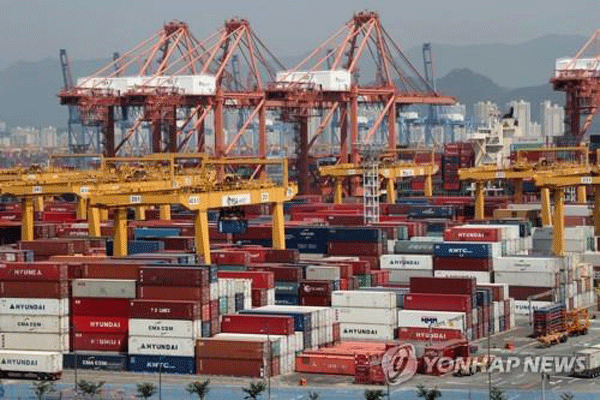South Korea's finance ministry is expected to slightly cut its growth estimate for the year in the face of a delayed recovery in chip prices and the escalating trade dispute between the United States and China, sources said Sunday.
The South Korean government has been adhering to the stance that Asia's fourth-largest economy will gather pace during the second half of the year on the back of an improvement in prices of chips, a major export item for the country, and expanded fiscal spending.

But a decline in chip prices is not showing signs of a let-up, and the American-Sino trade war is forecast to last longer than expected, they said.
The finance ministry has been expecting the economy to grow between 2.5 percent and 2.6 percent this year, and it would cut the range by 0.1 percentage point or more, they said.
Most think tanks and global institutes have already sharply trimmed their outlook for the economy.
The Bank of Korea (BOK) trimmed its estimate to 2.5 percent from 2.6 percent. The state-run Korea Development Institute put its estimate at 2.4 percent.
Foreign investment banks put out an average estimate of 2.3 percent growth for the South Korean economy, with Nomura being the most pessimistic with a forecast of 1.8 percent expansion.
More recently, global credit appraiser Fitch Ratings substantially slashed its growth outlook for South Korea's economy this year to 2 percent from its earlier 2.5 percent estimate, citing weaker underlying momentum.
Global investment bank Goldman Sachs also revised down its growth outlook for South Korea's economy this year to 2.1 percent from its previous forecast of 2.3 percent.
The South Korean economy expanded 2.7 percent in 2018, down from a solid 3.1 percent the previous year.
Seoul's exports have been on the decline since December amid the escalating trade tensions between the world's two largest economies. Shipments to China, the world's single largest importer of South Korean products, have also been on the wane since November.
Exports of semiconductors, the bellwether for the country's exports, continued to decline last month.
Outbound shipments of chips reached US$7.53 billion in May, falling a whopping 30 percent from a year earlier, and shipments of petrochemical products also nose-dived 16.2 percent over the period to $3.66 billion on weaker demand from China, government data showed.
South Korea's exports fell 10 percent in the first 20 days of June from a year earlier on weaker global demand for semiconductors, heralding that this month's outbound shipments would not be good as well.
The economy unexpectedly contracted 0.3 percent in the first quarter of the year from three months earlier, marking the worst performance in a decade, due to a sharper-than-expected dip in exports and facility investment.
In a bid to buttress the economy against a slowdown, the government front-loaded its budget spending with the goal of implementing 61 percent of its annual budget in the first six months of the year.
In April, the government also proposed a 6.7 trillion-won ($5.6 billion) extra budget, but it is still pending at the National Assembly due to a political standoff.
Against this backdrop, the BOK is increasingly facing calls to cut its policy rate, currently at 1.75 percent, to help the economy stay on a growth track amid low inflation. The central bank has kept the rate unchanged since November, but it is widely expected to cut the benchmark rate next month at the earliest.
The bank is also set to release its revised growth forecast in mid-July.
Meanwhile, the finance ministry is set to unveil its economic policy plans for the second half of the year early next month, which center on measures to boost business spending and private spending amid flagging exports.
The measures may include a wide range of tax incentives to encourage corporate spending, the sources said.
Earlier, Finance Minister Hong Nam-ki stressed that more bold action is needed to kick-start corporate capital spending and private spending as well.(Yonhap)

